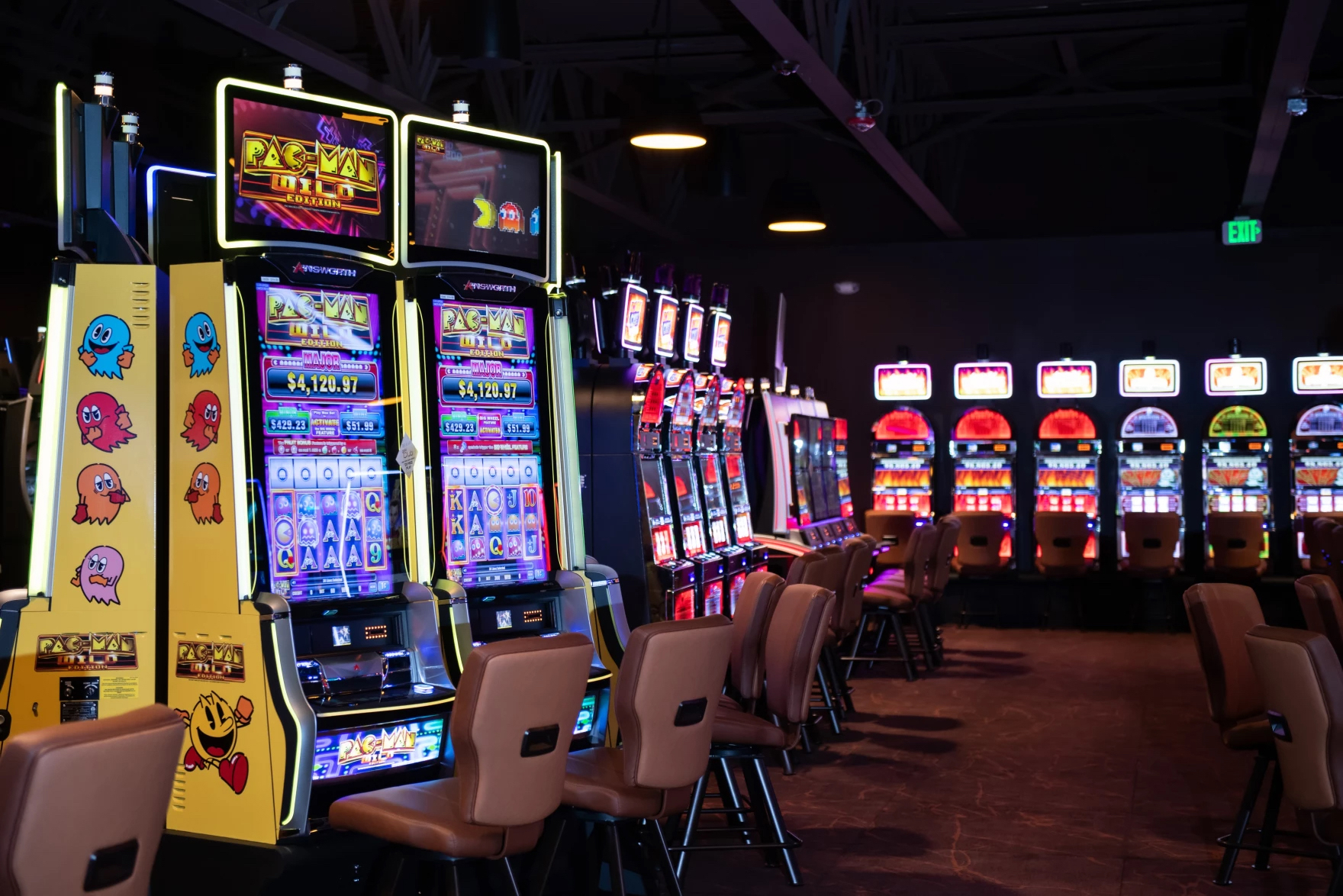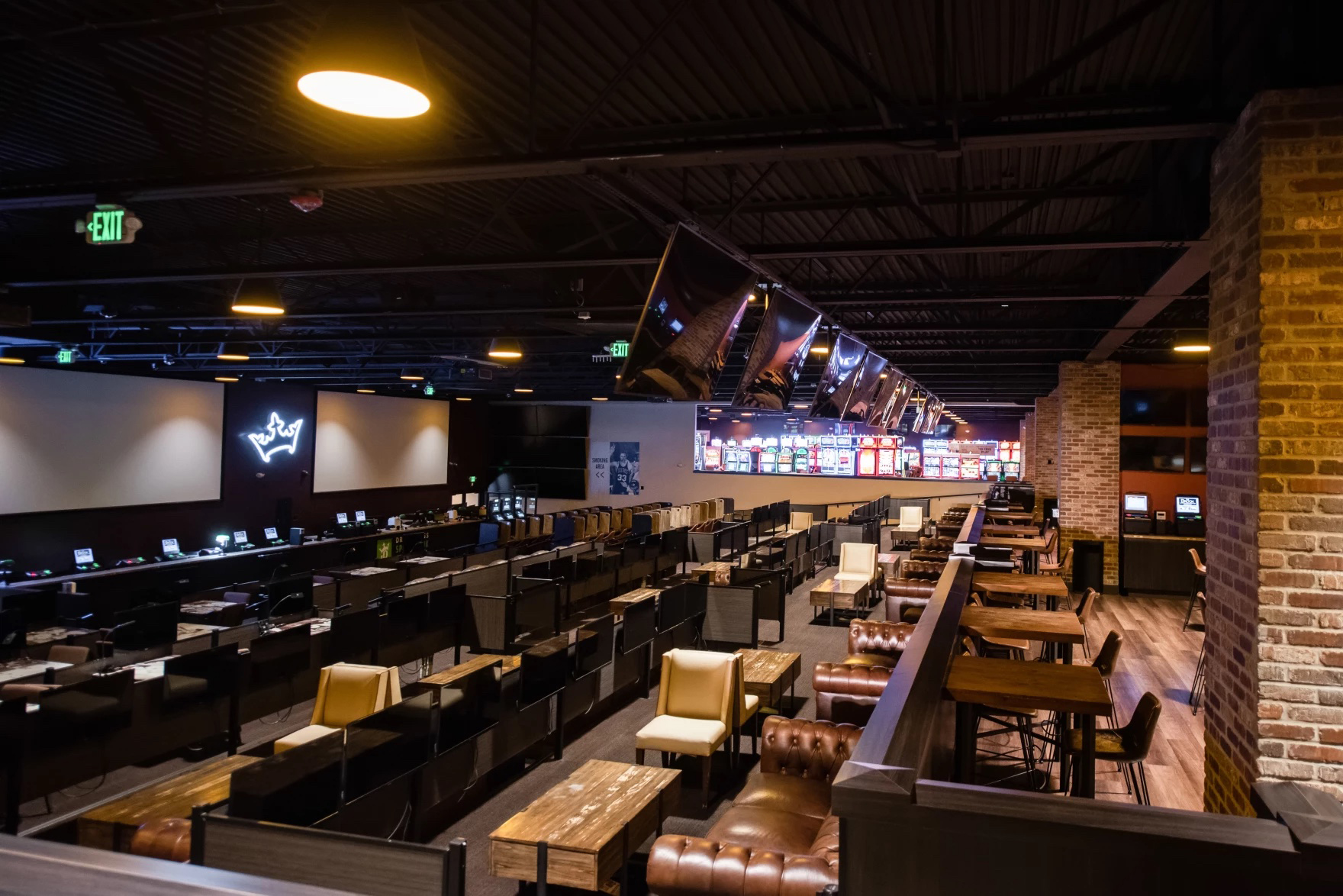After years of defeats in the Legislature, the industry has blossomed

The Brook, a charitable gaming facility in Seabrook, recently added more than 500 slot-like machines. (Courtesy photo)For a long time, they raced greyhounds in Seabrook. The skinny dogs are gone, but some of the same gamblers from those days still come out.
“You know how many times I walked around the dog track that’s still out there?” Mike Moodie ponders aloud. “I’ve walked around … if I could have a dollar …” Moodie washed dishes at the old Seabrook Greyhound Park when he was a teenager. Now, he comes to place bets at what’s replaced it: a massive entertainment destination called The Brook. With table games, concert stages, sports gambling windows and slot machines, it has emerged as one of the preeminent gambling sites in New Hampshire.
“What these guys have done is unbelievable, what they’ve done to this old track,” said Moodie, who had come to place bets on simulcast greyhound races. “Everything here is done right. That’s all I can say.”
The Brook is a stark symbol of New Hampshire’s embrace over the past decade of a wide range of gambling options — a suite of offerings that would have been all but unimaginable just a few years ago.
Though a bill to legalize casinos never passed in the State House, so-called charitable gaming facilities have proliferated, and evolved into exact replicas of casinos, complete with craps games, complicated carpet patterns and rows of slot machines. The state has legalized other forms of gambling in recent years, both online and in-person.
But for those who watched the pitched fights over casinos that once dominated the NH Legislature, a facility like The Brook may seem a head-scratcher — a casino in all but name, and all perfectly legal.
“It looks like a casino. That’s what we were aiming for, and that’s what it looks like,” said Rick Newman, a longtime gaming industry lobbyist in New Hampshire.

A seating area inside The Brook, where gamblers can wager on sports, horse and greyhound races. (Courtesy photo)
Bucking the odds
There are currently 14 charitable gaming facilities spread across the state. And while they may look like casinos on the inside, there are some important differences from traditional casinos. Gamblers at these places are limited in how much they can bet in a single wager, currently $10. Owners are also required to give 35 percent of revenues to a rotating list of nonprofits: In the state’s recent fiscal year, more than $14.8 million went to charities.
Still, the notion of such round-the-clock gambling on a large scale was for years one of the most hotly contested debates in Concord.
“Yes, they were always very close, always very contentious,” said Newman.
“Sometimes the most contentious issue of a legislative session.”
Peel back to the year 2000, and then-Gov. Jeanne Shaheen is asked about gambling during a gubernatorial debate with Gordon Humphrey. Casinos came up on the trail in 2010, when John Stephen ran against then-Gov. John Lynch. Then in 2014, then-Gov. Maggie Hassan proposed to balance the budget with a single casino license.
There were marathon hearings over bills to legalize a “high-end” casino in Salem, or in Salem and the North Country, or plenty of other combinations of locations. Jim Rubens, who led the fight against casinos in those years, will happily tell you that no casino bills ever passed.
“We managed by holding together the coalition to defeat them every single year,” he said.
Rubens ran the Granite State Coalition Against Expanded Gambling, bringing together Christian conservatives who saw gambling as immoral, and social justice advocates who saw it as a recipe for addiction. There were gambling opponents who thought a casino would spoil the brand of the state, and plenty who worried more state revenue would grow state government.
And yet, here we are, with gambling easily accessible in New Hampshire. The battles were won, but Ruben still seemingly lost the war.
“It is just accepted, that is what people want,” he said. “It is not worth the fight to stop it anymore.”
A nearly two-decade long effort
So how did this happen? How did New Hampshire end up with casinos, in all but the name?
Newman reflected that the key for the gambling lobby was to do it incrementally. No long shots: Just lots of small wins.
“If you look at where we are now, it may look like there’s been a dramatic change. But remember, that overnight change took place over 18 years,” he said.
In 2006, the state agreed to let private companies run the charitable casinos, not just nonprofits, which professionalized the system and brought an influx of cash.
Then came legalized keno — a kind of lottery-like gambling game — and online scratch tickets driven by the NH Lottery Commission. Sports gambling became legal under a 2018 U.S. Supreme Court decision, and then the state legalized slot machines, though they aren’t technically called slots. Known as historical horse racing, the machines run on a different odds formula than a traditional slot machine. But sit down, slip in a buck, and it is very much the thrill of a one-armed bandit.
Last year, a new law let charity casinos stay open up to 20 hours a day.
This year in Concord, there are bills to raise the maximum bets on table games from $10 to $50 per wager, and also a measure to legalize online casino games. Not a single member of the public came to testify against it at a recent hearing, though the measure will likely face opposition if it clears the state Senate.
For casino managers like Andre Carrier, who operates the Brook as an employee-owned company, one remaining hurdle is getting the word out that casinos are here.
“Do I think that’s an issue in New Hampshire, like people just don’t know that we exist? Yeah, I do,” he said.
Carrier spoke to NHPR from Las Vegas, where he owns another casino, the Eureka.
He said the two markets — Nevada and New Hampshire — and what you can do on a night out with a little cash in your pocket in each location, aren’t that different anymore.
“Less and less, is probably the honest answer,” said Carrier. “ And if I do a good job, the experience you are afforded in New England really should be exceptional.”
Gamblers everywhere all want the same thing: a chance to have fun and make a little money, despite the odds being stacked against them.
This article is being shared by partners in the Granite State News Collaborative. For more information, visit collaborativenh.org.